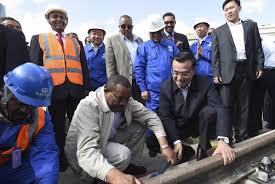
Ethiopia: Chinese Railway Contractors Providing Life Transforming Opportunities to Locals

Posted on :Tuesday , 14th March 2017
Addis Ababa — In rural and urban Ethiopia, Chinese contractors are busy building railways that are counted upon to speed up the industrialization of the east African country. Their presence has brought the locals life-transforming opportunities.
To achieve the goals set by the government of Ethiopia that targets 2,750km railroads by the end of 2020, many Chinese firms aided by Ethiopian laborers are working around the clock to meet the deadlines.
Ethiopia aims to link 49 cities across the country through the construction of six main railway lines. A 752km modern electric railway, linking landlocked Ethiopia with the port of Djibouti, came into service in October last year.
In all the efforts, Chinese firms have been playing vital roles. Their work has changed not only the landscape of Ethiopia, but the lives of individual Ethiopians.
Tewolde Tikue, aged 40 and an engineer by training, employs more than 200 manual workers after being sub-contracted to offer civil works at the road construction sites by the China's Railway Engineering Corporation (CREC) three years ago.
He has 15 permanent employees. Tewolde says he has benefited a lot since he started working with Chinese firms in Ethiopia. Previously, he was with another Chinese company, CGC Overseas Construction Group (CGCOC), where he fostered his entrepreneurial spirit.
He now has his own private company called OMIC Engineering PLC which provides electromechanical and civil works services.
At Lebbu Railway Station at the peripheries of Addis Ababa, Tewolde and his team are busy finishing up the construction of drainage channels and ditch covers that stretch more than one kilometer parallel to the interconnection road to the railway station.
Driving his SUV four-wheeler, Tewolde monitors his workers and is so far happy with the output as he is very strict on deadlines. The current works have to be done before the end of this month.
"There are workers who have been continuously working for us for three years. You can see changes in their lives. Their living standards have improved to some extent. The quality of jobs they deliver has been improving and they have acquired the needed skills," Tewolde says.
"Personally I have benefited from the project as well. I have upgraded my contractor license," he adds.
Apart from the monetary benefit that has come with getting contracts from the Chinese firms, Tewolde says it is the technical and managerial skills he has acquired since he started working with the Chinese that he values the most.
"On one hand, Chinese companies have created employment giving our people hope, while on the other, the skills we have acquired so far will go a long way in building our economy. We have learned things we could never even think were possible," he adds.
Tewolde's workers too are living testimonies to the positive changes the Chinese presence has brought about to their lives.
Ismael Keddir, one of the senior manual workers in Tewolde's team, says companies like CREC in Ethiopia have created jobs for the fresh graduates joining the workforce each year as well as a good number of manual workers like Ismael himself.
Ismael now being a full-fledged mason and has plans for the future.
He says he is saving a portion of his wage with an eye to setting up his own business.
"I have been working with CREC for the past two years. Before joining this company I have not really been in good shape. But now I have been able to save some money for the future. I am paid some three thousand birr (about 130 U.S. dollars) per month. This is a fair income for my field of work," he says.
Tsegaye Hailegnaw, another of Tewolde's employees, says his life took a different turn immediately after he landed the job. Being his third year with the company, Tsegaye says he has been able to save some money with which he intends to start a business and build his own home in the future.
"I have a plan to establish my own business in the future. I try to get five hundred birr (about 21 U.S. dollars) per day out of the line work I am assigned," says Tsegaye, impatient to get the shovel he is holding to work.
Tewolde plans to establish a steel manufacturing plant by next year, a milestone he has achieved, thanks to his partnership with Chinese firms. The prospect of being able to create more jobs fills the engineer with tremendous joy and pride.
According to the Ethiopian Investment Commission (EIC), there are 43 Chinese firms operating in Ethiopia. Investing close to two billion U.S dollars, the companies have been recognized by the government as the leading job providers among 120 foreign investors, employing tens of thousands of Ethiopians.
Please Select an Option
-
Exhibiting
-
Visiting
-
Information

Expogroup
Expogroup is a full service exhibition organiser with over 28 years experience in International trade exhibitions. Our current portfolio includes 28 annual exhibitions from a diverse range of industries being held across the Middle East & Africa.
EXPOGROUP © 1996 - 2024 | Privacy policy
